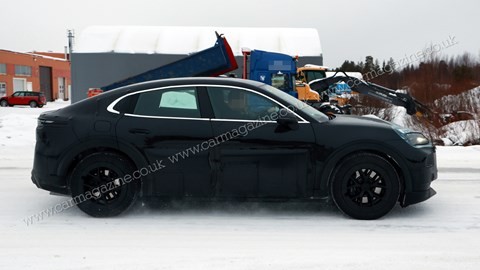Porsche has officially announced the all-electric Cayenne, marking a significant step into the future of performance SUVs. Set to debut in 2025, this fourth-generation Cayenne will be exclusively electric, utilizing the advanced Volkswagen Group Premium Platform Electric (PPE) architecture. Enthusiasts and industry watchers alike are eagerly anticipating the arrival of the Porsche Cayenne Electric, a vehicle poised to redefine the electric SUV landscape.
Extensive testing is already underway, with Porsche engineers subjecting prototypes to rigorous trials, accumulating millions of test kilometers before the official launch. These images from early testing hint at a design evolution, aligning the Porsche Cayenne Electric with the emerging design language seen in other Porsche EVs, like the electric Macan. Notably, the pill-shaped headlight signature is a prominent feature, suggesting a cohesive visual identity for Porsche’s electric lineup.
The strategic approach Porsche is taking with the Cayenne is particularly noteworthy. The upcoming fourth generation will be solely Porsche Cayenne Electric, built upon the PPE platform. This same architecture forms the foundation for the electric Macan, as well as Audi’s Q6 e-Tron and the forthcoming A6 e-Tron models. Porsche emphasizes that the PPE platform for the Porsche Cayenne Electric is undergoing “comprehensive further development,” indicating potential enhancements in battery technology and overall performance beyond what we’ve seen in current PPE-based vehicles. The 800-volt architecture, crucial for rapid charging, will be retained, ensuring the Porsche Cayenne Electric remains at the forefront of EV technology.
Interestingly, Porsche will continue to offer the current, third-generation Cayenne alongside the new electric model. This existing Cayenne will receive further upgrades, including a refined V8 engine and continued plug-in hybrid options. Porsche assures that “extensive technical measures will ensure that the twin-turbo engine is ready to comply with future legislative requirements,” demonstrating a commitment to offering diverse powertrain choices. This dual-generation strategy suggests Porsche is acknowledging varying market demands and the ongoing transition towards full electrification.
This approach reflects a broader trend in the automotive industry, with some manufacturers adjusting their electrification timelines in response to evolving market conditions and regulatory landscapes. While Porsche reiterates its strong commitment to electromobility, CEO Oliver Blume clarifies that their product strategy aims to achieve “more than 80 percent of our new cars fully electrified in 2030 – depending on the demand of our customers and the development of electromobility in the regions of the world.” This measured approach allows Porsche to cater to both the growing EV market and customers who may still prefer combustion or hybrid powertrains.
The 2025 launch of the all-electric, fourth-generation Porsche Cayenne Electric will be a pivotal moment for the brand. Alongside the electric Macan and the upcoming flagship electric SUV codenamed K1 (due in 2027), Porsche is building a comprehensive electric SUV portfolio. The Porsche Cayenne Electric is not just an addition to this lineup; it represents a bold step into the electric future, promising to deliver the performance and luxury expected of a Porsche, now with zero emissions. The automotive world is watching closely as Porsche pioneers the electric performance SUV segment with the highly anticipated Porsche Cayenne Electric.
